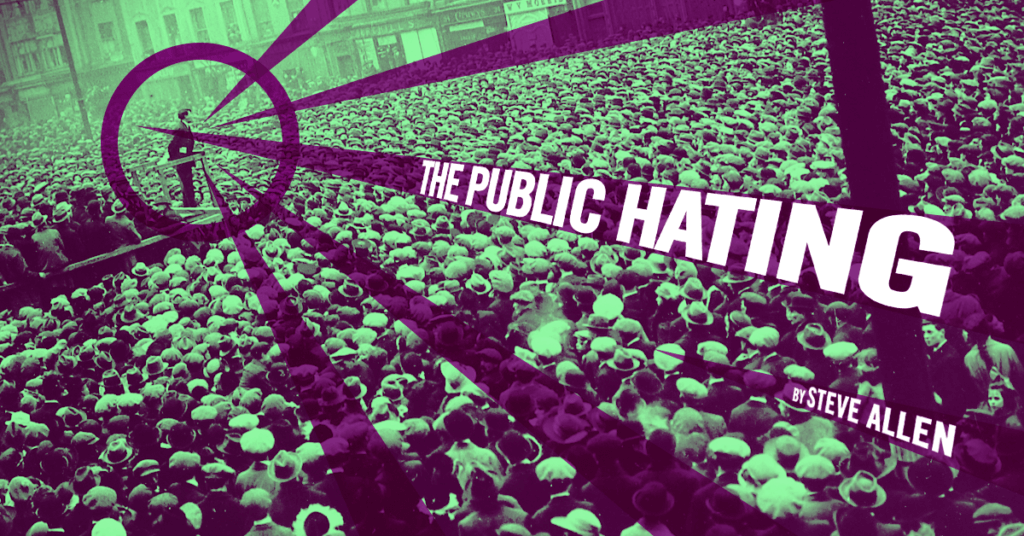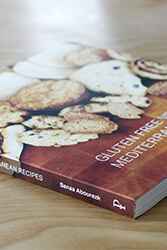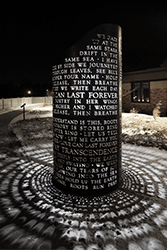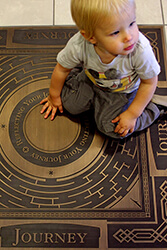The Public Hating

Short story by Steve Allen, originally published in 1955
The weather was a little cloudy on that September 9, 1978, and here and there in the crowds that surged up the ramps into the stadium people were looking at the sky and then at their neighbors and squinting and saying, “Hope she doesn’t rain.”
On television the weatherman had forecast slight cloudiness but no showers. It was not cold. All over the neighborhood surrounding the stadium, people poured out of street-cars and buses and subways. In ant-like lines they crawled across streets, through turnstiles, up stairways, along ramps, through gates, down aisles.
Laughing and shoving restlessly, damp-palmed with excitement, they came shuffling into the great concrete bowl, some stopping to go to the restrooms, some buying popcorn, some taking free pamphlets from the uniformed attendants.
Everything was free this particular day. No tickets had been sold for the event. The public proclamations had simply been made in the newspapers and on TV, and over 65,000 people had responded.
For weeks, of course, the papers had been suggesting that the event would take place. All during the trial, even as early as the selection of the jury, the columnists had slyly hinted at the inevitability of the outcome. But it had only been official since yesterday. The television networks had actually gotten a slight jump on the papers. At six o’clock the government had taken over all network facilities for a brief five-minute period during which the announcement was made.
“We have all followed with great interest,” the Premier had said, looking calm and handsome in a gray double-breasted suit, “the course of the trial of Professor Ketteridge. Early this afternoon the jury returned a verdict of guilty. This verdict having been confirmed within the hour by the Supreme Court, in the interests of time-saving, the White House has decided to make the usual prompt official announcement. There will be a public hating tomorrow. The time: 2:30 p.m. The place: Yankee Stadium in New York City. Your assistance is earnestly requested. Those of you in the New York area will find. . . . .”
The voice had gone on, filling in other details, and in the morning, the early editions of the newspapers included pictures captioned, “Bronx couple first in line,” and “Students wait all night to view hating” and “Early birds.”
By one-thirty in the afternoon there was not an empty seat in the stadium and people were beginning to fill up a few of the aisles. Special police began to block off the exits and word was sent down to the street that no more people could be admitted. Hawkers slipped through the crowd selling cold beer and hot-dogs.
Sitting just back of what would have been first base had the Yankees not been playing in Cleveland, Frederic Traub stared curiously at the platform in the middle of the field. It was about twice the size of a prize-fighting ring. In the middle of it there was a small raised section on which was placed a plain wooden kitchen chair.
To the left of the chair there were seating accommodations for a small group of dignitaries. Downstage, so to speak, there was a speaker’s lectern and a battery of microphones. The platform was hung with bunting and pennants.
The crowd was beginning to hum ominously.
At two minutes after two o’clock a small group of men filed out onto the field from a point just back of home plate. The crowd buzzed more loudly for a moment and then burst into applause. The men carefully climbed a few wooden steps, walked in single file across the platform, and seated themselves in the chairs set out for them. Traub turned around and was interested to observe high in the press box, the winking red lights of television cameras.
“Remarkable,” said Traub softly to his companion.
“I suppose,” said the man. “But effective.”
“I guess that’s right,” said Traub. “Still, it all seems a little strange to me. We do things rather differently.”
“That’s what makes horse-racing,” said his companion.
Traub listened for a moment to the voices around him. Surprisingly, no one seemed to be discussing the business at hand. Baseball, movies, the weather, gossip, personal small-talk, a thousand-and-one subjects were introduced. It was almost as if they were trying not to mention the hating.
His friend’s voice broke in on Traub’s reverie.
“Think you’ll be okay when we get down to business? I’ve seen ’em keel over.”
“I’ll be all right,” said Traub. Then he shook his head. “But I still can’t believe it.”
“What do you mean?”
“Oh, you know, the whole thing. How it started. How you found you could do it.”
“Beats the hell out of me,” said the other man. “I think it was that guy at Duke University first came up with the idea. The mind over matter thing has been around for a long time, of course. But this guy, he was the first one to prove scientifically that mind can control matter.”
“Did it with dice, I believe,” Traub said.
“Yeah, that’s it. First he found some guys who could drop a dozen or so dice down a chute of some kind and actually control the direction they’d take. Then they discovered the secret—it was simple. The guys who could control the dice were simply the guys who thought they could.
“Then one time they got the idea of taking the dice into an auditorium and having about 2,000 people concentrate on forcing the dice one way or the other. That did it. It was the most natural thing in the world when you think of it. If one horse can pull a heavy load so far and so fast it figures that 10 horses can pull it a lot farther and a lot faster. They had those dice fallin’ where they wanted ’em 80 percent of the time.”
“When did they first substitute a living organism for the dice?” Traub asked.
“Damned if I know,” said the man. “It was quite a few years ago and at first the government sort of clamped down on the thing. There was a little last-ditch fight from the churches, I think. But they finally realized you couldn’t stop it.”
“Is this an unusually large crowd?”
“Not for a political prisoner. You take a rapist or a murderer now, some of them don’t pull more than maybe twenty, thirty thousand. The people just don’t get stirred up enough.”
The sun had come out from behind a cloud now and Traub watched silently as large map-shaped shadows moved majestically across the grass.
“She’s warming up,” someone said.
“That’s right,” a voice agreed. “Gonna be real nice.”
Traub leaned forward and lowered his head as he retied the laces on his right shoe and in the next instant he was shocked to attention by a gutteral roar from the crowd that vibrated the floor.
In distant right center-field, three men were walking toward the platform. Two were walking together, the third was slouched in front of them, head down, his gait unsteady.
Traub had thought he was going to be all right but now, looking at the tired figure being prodded toward second base, looking at the bare, bald head, he began to feel slightly sick.
It seemed to take forever before the two guards jostled the prisoner up the stairs and toward the small kitchen chair.
When he reached it and seated himself the crowd roared again. A tall, distinguished man stepped to the speaker’s lectern and cleared his throat, raising his right hand in an appeal for quiet. “All right,” he said, “all right.”
The mob slowly fell silent. Traub clasped his hands tightly together. He felt a little ashamed.
“All right,” said the speaker. “Good afternoon, ladies and gentlemen. On behalf of the President of the United States I welcome you to another Public Hating. This particular affair,” he said, “as you know is directed against the man who was yesterday judged guilty in United States District Court here in New York City—Professor Arthur Ketteridge.”
At the mention of Ketteridge’s name the crowd made a noise like an earthquake-rumble. Several pop-bottles were thrown, futilely, from the center-field bleachers.
“We will begin in just a moment,” said the speaker, “but first I should like to introduce the Reverend Charles Fuller, of the Park Avenue Reborn Church, who will make the invocation.”
A small man with glasses stepped forward, replaced the first speaker at the microphone, closed his eyes, and threw back his head.
“Our Heavenly Father,” he said, “to whom we are indebted for all the blessings of this life, grant, we beseech Thee, that we act today in justice and in the spirit of truth. Grant, O Lord, we pray Thee, that what we are about to do here today will render us the humble servants of Thy divine will. For it is written the wages of sin is death. Search deep into this man’s heart for the seed of repentance if there be such, and if there be not, plant it therein, O Lord, in Thy goodness and mercy.”
There was a slight pause. The Reverend Fuller coughed and then said, “Amen.”
The crowd, which had stood quietly during the prayer, now sat down and began to buzz again.
The first speaker rose. “All right,” he said. “You know we all have a job to do. And you know why we have to do it.”
“Yes!” screamed thousands of voices.
“Then let us get to the business at hand. At this time I would like to introduce to you a very great American who, to use the old phrase, needs no introduction. Former president of Harvard University, current adviser to the Secretary of State, ladies and gentlemen, Dr. Howard S. Weltmer!”
A wave of applause vibrated the air.
Dr. Weltmer stepped forward, shook hands with the speaker, and adjusted the microphone. “Thank you,” he said. “Now, we won’t waste any more time here since what we are about to do will take every bit of our energy and concentration if it is to be successfully accomplished. I ask you all,” he said, “to direct your unwavering attention toward the man seated in the chair to my left here, a man who in my opinion is the most despicable criminal of our time—Professor Arthur Ketteridge!”
The mob shrieked.
“I ask you,” said Weltmer, “to rise. That’s it, everybody stand up. Now, I want every one of you . . . I understand we have upwards of seventy thousand people here today . . . I want every single one of you to stare directly at this fiend in human form, Ketteridge. I want you to let him know by the wondrous power that lies in the strength of your emotional reservoirs, I want you to let him know that he is a criminal, that he is worse than a murderer, that he has committed treason, that he is not loved by anyone, anywhere in the universe, and that he is, rather, despised with a vigor equal in heat to the power of the sun itself!”
People around Traub were shaking their fists now. Their eyes were narrowed their mouths turned down at the corners. A woman fainted.
“Come on,” shouted Weltmer. “Let’s feel it!”
Under the spell of the speaker Traub was suddenly horrified to find that his blood was racing, his heart pounding. He felt anger surging up in him. He could not believe he hated Ketteridge. But he could not deny he hated something.
“On the souls of your mothers,” Weltmer was saying, “on the future of your children, out of your love for your country, I demand of you that you unleash your power to despise. I want you to become ferocious. I want you to become as the beasts of the jungle, as furious as they in the defense of their homes. Do you hate this man?”
“Yes!” roared the crowd.
“Fiend!” cried Weltmer, “Enemy of the people— Do you hear, Ketteridge?”
Traub watched in dry-mouthed fascination as the slumped figure in the chair straightened up convulsively and jerked at his collar. At this first indication that their power was reaching home the crowd roared to a new peak of excitement.
“We plead,” said Weltmer, “with you people watching today on your television sets, to join with us in hating this wretch. All over America stand up, if you will, in your living rooms. Face the East. Face New York City, and let anger flood your hearts. Speak it out, let it flow!”
A man beside Traub sat down, turned aside, and vomited softly into a handkerchief. Traub picked up the binoculars the man had discarded for the moment and fastened them on Ketteridge’s figure, twirling the focus-knob furiously. In a moment the man leaped into the foreground. Traub saw that his eyes were full of tears, that his body was wracked with sobs, that he was in obvious pain.
“He is not fit to live,” Weltmer was shouting. “Turn your anger upon him. Channel it. Make it productive. Be not angry with your family, your friends, your fellow citizens, but let your anger pour out in a violent torrent on the head of this human devil,” screamed Weltmer. “Come on! Let’s do it! Let’s get it over with!”
At that moment Traub was at last convinced of the enormity of Ketteridge’s crime, and Weltmer said, “All right, that’s it. Now let’s get down to brass tacks. Let’s concentrate on his right arm. Hate it, do you hear. Burn the flesh from the bone! You can do it! Come on! Burn him alive!”
Traub stared unblinking through the binoculars at Ketteridge’s right arm as the prisoner leaped to his feet and ripped off his jacket, howling. With his left hand he gripped his right forearm and then Traub saw the flesh turning dark. First a deep red and then a livid purple. The fingers contracted and Ketteridge whirled on his small platform like a dervish, slapping his arm against his side.
“That’s it,” Weltmer called. “You’re doing it. You’re doing it. Mind over matter! That’s it. Burn this offending flesh. Be as the avenging angels of the Lord. Smite this devil! That’s it!”
The flesh was turning darker now, across the shoulders, as Ketteridge tore his shirt off. Screaming, he broke away from his chair and leaped off the platform, landing on his knees on the grass.
“Oh, the power is wonderful,” cried Weltmer. “You’ve got him. Now let’s really turn it on. Come on!”
Ketteridge writhed on the grass and then rose and began running back and forth, directionless, like a bug on a griddle.
Traub could watch no longer. He put down the binoculars and staggered back up the aisle.
Outside the stadium he walked for 12 blocks before he hailed a cab.
The Public Hating, by Steve Allen, was originally published in 1955 in The Public Hating: A Collection of Short Stories. It is reprinted here as a commentary on the tone and rhetoric of our national conversation. God have mercy on us all.
To read more articles like this visit: Uncategorized








